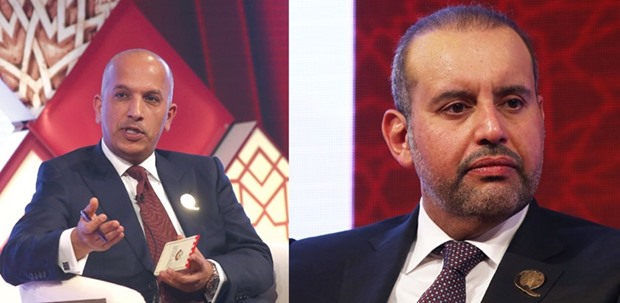Qatar plans to increase its investments in the UK by £5bn ($6.3bn) within the next five years, deepening the countries’ trade ties as London prepares to quit the European Union.
The Gulf country already has about £35bn of investments in the UK, ranging from the Harrods department store to The Savoy hotel and the Shard skyscraper. It is now weighing opportunities in areas including infrastructure, real-estate and technology, HE the Finance Minister Ali Sherif al-Emadi told Bloomberg Television in an interview yesterday at an investment forum in London. The plan will be carried out through the Qatar Investment Authority, the country’s sovereign wealth fund, and its subsidiaries, he said.
Al-Emadi is part of a delegation of more than 400 Qatari officials and business executives visiting London and Birmingham for a two-day investment forum. The visit concludes today, a day before UK Prime Minister Theresa May plans to start the two-year clock on Brexit negotiations by invoking Article 50 of the Lisbon Treaty.
Qatari investments would help to cushion the economic fallout from Brexit on both sides. Ahead of the break, the UK is taking steps to maintain foreign investments, going as far as to provide written assurances to Nissan Motor Co in an effort to stem competition from other EU members that want to poach talent and capital.
Qatar, too, has a big stake in keeping the UK economy and asset prices strong during and after Brexit. It’s the world’s biggest producer of liquefied natural gas, and delivers 90% of the UK’s imports of the fuel. Qatar invested billions in Barclays during the global financial crisis and has built up a stock and real estate portfolio over the past decade.
“We look at our investments purely on commercial basis,” al-Emadi said. “We were heavily investing in the UK and Europe during the financial crisis. Most of our investments are very much long-term.”
“Infrastructure is going to be part of it,” he said. “It’s an area that we like and we think there will be good opportunities in the UK market. In real estate, we have a strong portfolio here that has done extremely well and we don’t mind adding up.”
QIA chief executive officer Sheikh Abdullah bin Mohamed bin Saud al-Thani said the wealth fund has “committed a big amount of investment in the UK” during its last strategy session.
“There is a pressure from my board to diversify in terms of geography and asset class, but we are still looking, even after Brexit, for opportunities,” he said at the forum.
The Qatari delegation to the UK includes chief executive officers of Qatar Petroleum and Qatar Airways.
“Qatar doesn’t see Britain leaving the EU as impacting their relationship and it may be an opportunity for it to be stronger,” Rachel Pether, an adviser at the Sovereign Wealth Fund Institute, said in a phone interview from Dubai on March 22.
Al-Emadi said his country would also encourage any talks between the US and the six-member Gulf Cooperation Council, which includes Qatar, to establish a free trade agreement after Brexit.
Protecting the value of its UK assets isn’t the only motivation behind Qatar’s road show. In an era of lower oil prices, Officials are seeking more investment flows as the country diversifies its economy away from oil and gas and continues a $200bn infrastructure upgrade before the 2022 World Cup.
“We want to attract institutional money from the UK, especially through our forthcoming exchange-traded fund that will list on the Qatar Stock Exchange,” said Fahmi Alghussein, CEO of Doha-based asset manager Amwal, who attended the London event.
One indicator of Qatari appetite for investment in the UK is continued purchases of real estate, both by the state fund and individuals. Foreign investors see the top end of London’s property market as an attractive haven, with the pound’s slump offsetting political uncertainty, according to Laurence Ronson, sales director at Ronson Capital Partners.
“London looks like exceedingly good value in terms of a weakened sterling,” Ronson, who is developing two luxury buildings in the capital, said in an interview in Doha on March 23. “We’ve seen that with Chinese, Middle Eastern and American money looking at opportunities. All the doom and gloom that has been predicted post-Brexit has not happened. In fact, the economy is growing.” Page 2

HE the Finance Minister Ali Sherif al-Emadi speaks at the Qatar-UK Business and Investment Forum in London yesterday. Right: Qatar’s Minister for Economy and Commerce HE Ahmed bin Jassim bin Mohamed al-Thani speaks at the Qatar-UK Business and Investment Forum in London yesterday.
